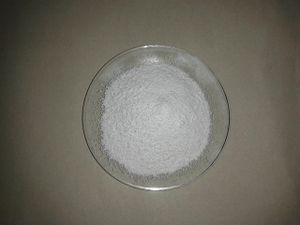Sodium percarbonate
 Sodium percarbonate from the store.
| |
| Names | |
|---|---|
| IUPAC name
Sodium carbonate—hydrogen peroxide (2/3)
| |
| Other names
Sodium carbonate hydrogen peroxide
Sodium carbonate peroxyhydrate Sodium carbonate sesquiperhydrate Solid hydrogen peroxide | |
| Properties | |
| Na2CO3·1.5 H2O2 | |
| Molar mass | 156.982 g/mol |
| Appearance | White granular powder |
| Density | 2.1 g/cm3 |
| Melting point | 100–125 °C (212–257 °F; 373–398 K) (decomposes); Decomposition begins > 50°C |
| Boiling point | Decomposes |
| 15 g/100 ml (at 20°C) | |
| Solubility | Insoluble in benzene |
| Vapor pressure | Negligible |
| Thermochemistry | |
| Std enthalpy of
formation (ΔfH |
-1,475.3 kJ/kmol |
| Hazards | |
| Safety data sheet | ScienceLab |
| Related compounds | |
| Related compounds
|
Sodium carbonate |
| Except where otherwise noted, data are given for materials in their standard state (at 25 °C [77 °F], 100 kPa). | |
| Infobox references | |
Sodium percarbonate is a chemical compound, more specifically an adduct of sodium carbonate and hydrogen peroxide with the formula 2 Na2CO3·3 H2O2. It is widely used in cleaning.
Contents
[hide]Properties
Chemical
Sodium percarbonate is a convenient source of hydrogen peroxide in many reactions. It contains 32.5% H2O2 by weight.
Physical
Sodium percarbonate is a white solid, soluble in water.
Availability
Sodium percarbonate is sold in most stores as OxiClean. Sometimes it may have perfumes or other additives.
Preparation
Sodium percarbonate can be made by carefully recrystallizing sodium carbonate from a concentrated aqueous solution of hydrogen peroxide.
Projects
- Cleaning
- Oxidizing organic compounds
- Source of hydrogen peroxide
- Make dichromates
Handling
Safety
Sodium percarbonate is a strong oxidizer and should be kept away from combustible materials and open flame.
Storage
Sodium percarbonate should be kept in closed bottles, in cool places, away from organic materials.
Disposal
Can be poured down the drain or heated to decompose it.